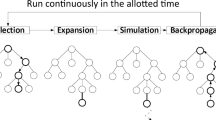Abstract
In this work, we investigate a berth allocation game involving m identical berths and n vessels. Each vessel selfishly selects a consecutive set of berths for unloading, with the objective of minimizing its own cost represented by the maximum load among the chosen berths. The social cost is defined as the makespan, i.e., the maximum load over all berths. Our game generalizes classical machine scheduling games where jobs (vessels) may require multiple consecutive machines (berths). We analyze the price of anarchy (PoA) of the berth allocation game, which quantifies the impact of selfish behaviors of vessels. Specifically, we first consider a special case where each job can occupy at most two consecutive machines, and derive exact upper and lower bounds for the PoA based on the number of machines m. We show that the PoA asymptotically approaches \(\frac{9}{4}\). For the general case where each job can occupy an arbitrary number of consecutive machines, we obtain a tight bound for the PoA, which is \(\Theta \left( \frac{\log m}{\log \log m}\right) \).





Similar content being viewed by others
References
Andelman, N., Feldman, M., & Mansour, Y. (2009). Strong price of anarchy. Games and Economic Behavior, 65(2), 289–317.
Awerbuch, B., Azar, Y., Richter, Y., & Tsur, D. (2006). Tradeoffs in worst-case equilibria. Theoretical Computer Science, 361(2–3), 200–209.
Bierwirth, C., & Meisel, F. (2015). A follow-up survey of berth allocation and quay crane scheduling problems in container terminals. European Journal of Operational Research, 244(3), 675–689. https://doi.org/10.1016/j.ejor.2014.12.030
Bukchin, Y., Raviv, T., & Zaides, I. (2020). The consecutive multiprocessor job scheduling problem. European Journal of Operational Research, 284(2), 427–438.
Caragiannis, I., & Fanelli, A. (2019). An almost ideal coordination mechanism for unrelated machine scheduling. Theory of Computing Systems, 63(1), 114–127.
Chen, J., & Lee, C.-Y. (1999). General multiprocessor task scheduling. Naval Research Logistics (NRL), 46(1), 57–74.
Czumaj, A., & Vöocking, B. (2007). Tight bounds for worst-case equilibria. ACM Transactions on Algorithms (TALG), 3(1), 4.
Finn, G., & Horowitz, E. (1979). A linear time approximation algorithm for multiprocessor scheduling. BIT Numerical Mathematics, 19(3), 312–320.
Guan, Y., Xiao, W.-Q., Cheung, R. K., & Li, C.-L. (2002). A multiprocessor task scheduling model for berth allocation: Heuristic and worst-case analysis. Operations Research Letters, 30(5), 343–350.
Huang, J., Chen, J., Chen, S., & Wang, J. (2007). A simple linear time approximation algorithm for multi-processor job scheduling on four processors. Journal of Combinatorial Optimization, 13(1), 33–45.
Imai, A., Sun, X., Nishimura, E., & Papadimitriou, S. (2005). Berth allocation in a container port: Using a continuous location space approach. Transportation Research Part B: Methodological, 39(3), 199–221.
Koutsoupias, E., & Papadimitriou, C. (1999). Worst-case equilibria. In Annual symposium on theoretical aspects of computer science (pp. 404–413).
Lianeas, T., Nikolova, E., & Stier-Moses, N. E. (2019). Risk-averse selfish routing. Mathematics of Operations Research, 44(1), 38–57.
Lloyd, E. L. (1981). Concurrent task systems. Operations Research, 29(1), 189–201.
Nash, J. (1951). Non-cooperative games. The Annals of Mathematics, 54(2), 286–295.
Rodrigues, F., & Agra, A. (2022). Berth allocation and quay crane assignment/ scheduling problem under uncertainty: A survey. European Journal of Operational Research, 303(2), 501–524.
Roughgarden, T. (2004). Selfish routing with atomic players. In Proc. 16th symp. on discrete algorithms (soda) (pp. 1184–1185).
Schuurman, P., & Vredeveld, T. (2007). Performance guarantees of local search for multiprocessor scheduling. INFORMS Journal on Computing, 19(1), 52–63.
Author information
Authors and Affiliations
Corresponding author
Additional information
Publisher's Note
Springer Nature remains neutral with regard to jurisdictional claims in published maps and institutional affiliations.
This work was supported by Guangdong Basic and Applied Basic Research Foundation (China) [2020A1515110202, 2022B1515120060] .
Rights and permissions
Springer Nature or its licensor (e.g. a society or other partner) holds exclusive rights to this article under a publishing agreement with the author(s) or other rightsholder(s); author self-archiving of the accepted manuscript version of this article is solely governed by the terms of such publishing agreement and applicable law.
About this article
Cite this article
Pan, J., Chen, C. & Xu, Y. The price of anarchy for a berth allocation game. J Sched 27, 51–60 (2024). https://doi.org/10.1007/s10951-023-00791-9
Accepted:
Published:
Issue Date:
DOI: https://doi.org/10.1007/s10951-023-00791-9




